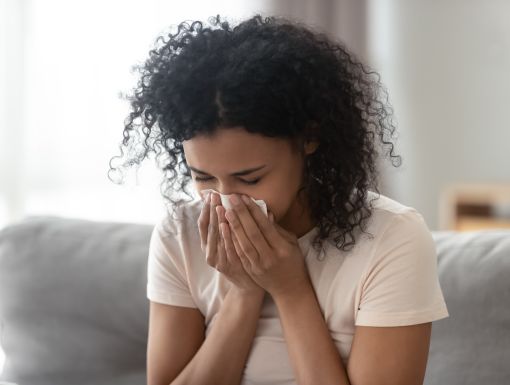
Is It Possible To Get Hay Fever and Fever At The Same Time?
Hay fever, medically known as allergic rhinitis, is an allergy to something within the environment.
The American Academy of Allergy, Asthma & Immunology (AAAAI) says hay fever affects almost 8% of adults and 9% of children in the United States. A total of 60 million people a year in the United States are affected by hay fever, according to the Centers for Disease Control and Prevention (CDC). Hay fever is not detrimental or severe, but it can be uncomfortable.
Common symptoms of hay fever include:
- Congestion
- Sneezing
- Runny nose
- Fatigue
- Itchy eyes, mouth or skin
- Watery eyes
- Red eyes
- Headaches
- Sore throat
- Postnasal drip
- Wheezing
Your body reacts to a foreign environmental substance when you have hay fever. These substances are called allergens, and can be things like pollen, mold, pet dander and dust mites. Non-allergen irritants such as cigarette smoke, perfume and diesel exhaust can also cause hay fever. With hay fever, the body responds to allergens by releasing chemicals, including histamine, to protect itself from the allergen, as it thinks it is an intruder. This causes various allergy symptoms and discomfort.
Is hay fever similar to fever experienced with a cold or other illnesses? How is it avoided, and is it something to cause concern?
Can you have a fever with hay fever?
The short answer is no.
Fever occurs when the body’s temperature increases or rises due to disease and illness. A temperature of about 99 or 99.5 degrees is usually considered a fever. An infection that causes fever can occur when mucus in the sinuses builds up, developing bacteria. Congestion can be caused by allergies, sinusitis, the common cold or the flu, leading to an elevated temperature or fever. Hay fever symptoms are very similar to the cold and flu, making it difficult for your doctor to determine the cause of your symptoms. Unlike the common cold, you do not have a fever with hay fever, and it is not contagious.
Can hay fever be treated?
Hay fever can be experienced year-round or seasonally, especially in the spring, summer and early fall.
Seasonal allergies are usually caused by pollen, trees, grass, flowers and even insects. Spring, summer and early fall are the times we tend to be outside enjoying the weather, and with that may come hay fever. Other common seasonal allergens include outdoor mold and ragweed, which are seen in the fall.
Indoor allergens usually become bothersome in the winter, as most people stay inside during colder temperatures. Allergens such as dust mites, mold and pet dander can cause perennial allergic rhinitis, otherwise known as year-round hay fever.
To avoid hay fever:
- Be mindful of your environment.
- Try to avoid irritants such as cigarette smoke, perfume and diesel exhaust.
- Keep your windows up when driving and close them when inside your house.
- Wear a hat, eyeglasses or sunglasses to protect your eyes from pollen.
- Try your best to avoid rubbing your eyes, nose and face.
- The best advice is to wash your hands often, especially after interacting with a pet or animal.
You can always make adjustments in your home to try to prevent allergies. Avoid dust mites using filters in your vacuum. Clean the vacuum when completed. Also, use air condition filters designed to reduce allergens. To control mold within your home, utilize a dehumidifier.
Though hay fever is not life-threatening or dangerous, it can cause discomfort and difficulty in everyday life. Those with hay fever may experience irritability, sleep disorders, trouble concentrating, difficulty making decisions, memory trouble or impaired hand-eye coordination. Hay fever may cause those affected to miss work or school simply because they do not feel well or have severe symptoms.
A doctor can usually determine if allergies are causing your hay fever symptoms. An allergen-specific immunoglobin E (IgE) test is blood test your doctor can run to diagnose environmental allergies. A skin prick test is the most accurate and helps pinpoint the allergen causing your symptoms. By sharing your symptoms and medical history with your physician, the appropriate testing method can be determined.
Hay fever is usually treated with over-the-counter medication, but a medication can be prescribed by your doctor if necessary. Medicine can include antihistamines, decongestants, corticosteroids or immunotherapy. It can come in the form of liquids, pills, eye drops, nasal spray and injections. It is always best to consult your physician if you are not feeling well or experiencing hay fever.
Hay fever can be manageable with the correct medication and lifestyle changes. It’s important to listen to your body, pay attention when symptoms occur and share this information with your doctor if you are not feeling well.
Schedule an appointment and learn more about Jo Reed, MD.



